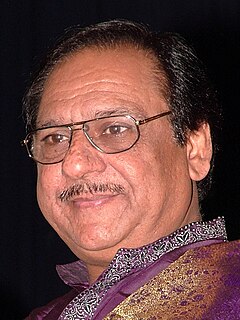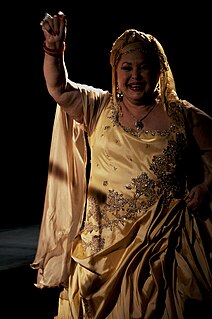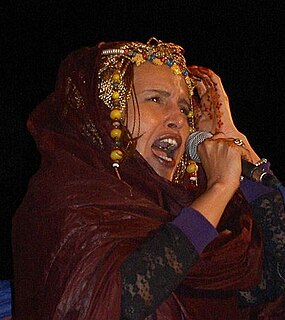
Gordon Matthew Thomas Sumner, known as Sting, is an English musician and actor. He was the frontman, songwriter and bassist for new wave rock band the Police from 1977 to their breakup in 1986. He launched a solo career in 1985 and has included elements of rock, jazz, reggae, classical, new-age, and worldbeat in his music.
Ethiopian music is a term that can mean any music of Ethiopian origin, however, often it is applied to a genre, a distinct modal system that is pentatonic, with characteristically long intervals between some notes.

The Music of the Somali people is music following the musical styles, techniques and sounds of the Somali people.

Zenzile Miriam Makeba, nicknamed Mama Africa, was a South African singer, songwriter, actress, and civil rights activist. Associated with musical genres including Afropop, jazz, and world music, she was an advocate against apartheid and white-minority government in South Africa.

Ustad Ghulam Ali is a Pakistani ghazal singer of the Patiala Gharana. He has also been a prominent playback singer in Bollywood. Ghulam Ali was a disciple of Bade Ghulam Ali Khan. Ali was also trained by Bade Ghulam Ali's younger brothers – Barkat Ali Khan and Mubarak Ali Khan.
Reem Kelani is a British Palestinian musician, born in Manchester, England. Initially influenced by the jazz music her father played on his record player, her interest in Palestinian music was sparked by the music at a family wedding in her maternal home in Galilee in the 1970s.
The Ogaden is one of the major Somali clans.

Esma Redžepova-Teodosievska was a Macedonian Romani vocalist, songwriter and humanitarian. Because of her prolific repertoire, which included hundreds of songs, and because of her contribution to Romani culture and its promotion, she was nicknamed the Queen of the Gypsies.
Somalis in the United Kingdom include British citizens and residents born in or with ancestors from Somalia. The United Kingdom (UK) is home to the largest Somali community in Europe, with an estimated 108,000 Somali-born immigrants residing in the UK in 2018 according to the Office for National Statistics. The majority of these live in England, with the largest number found in London. Smaller Somali communities exist in Birmingham, Bristol, Manchester, Liverpool, Leicester, Milton Keynes, Sheffield and Cardiff.
Asa Singh Mastana (1926–1999) was a Punjabi musician and singer best known for lending his voice to the hit Bollywood film Heer, and singing jugni and Heer-genre of folk songs, which recount the tales of Heer Ranjha by poet Waris Shah. He became popular in the 1940s, by the mid-1960s, when state-run All India Radio started promoting folk musicians, this made him, along with Surinder Kaur and Kuldeep Manak singers of cult status.
Dur-Dur Band was a musical group from Mogadishu, Somalia. The band was formed in the 1980s and was one of the most well-known acts on the Mogadishu disco scene at the time. The band later performed and recorded based in neighbouring Ethiopia. Their unique sound encompasses funk and disco, with influences of soul.
Immigration in Somalia is regulated by the Somali Immigration Department of the Federal Government of Somalia.

Dhaanto is a style of traditional Somali music and folk dance. It is cultural folk dance native to Somali people in the Horn of Africa region.

Maciek Pysz is a jazz musician, guitarist and composer. He is known for his clear lyrical phrasing, his virtuosity and his imaginative, cinematic compositions inspired by people, places and experiences.

Insight is an album by jazz musician Maciek Pysz, released in May 2013 on 33 Jazz Records. All tracks are composed by Pysz, except track 3, which is jointly composed and arranged by Gianluca Corona and Maciek Pysz.

The Somali Museum of Minnesota is a cultural institution in Minneapolis, Minnesota, United States. The Minneapolis–Saint Paul metro area is home to the largest Somali immigrant and refugee population in the United States, after civil war in Somalia prompted large-scale displacement of the Somali people. The Somali Museum of Minnesota presents a collection of more than 1000 traditional nomadic artifacts from Somalia, as well as educational programming about Somali culture, arts events, and cross-cultural activities. It may now be the only museum in the world dedicated to preserving Somali culture and traditions.

Mohamed Sulayman Tubeec, was a Somali singer, songwriter and record producer, called the King of Voice.

A Journey is an album by jazz musician Maciek Pysz, released in October 2015 on Dot Time Records. All tracks are composed by Pysz, except track 6, which is composed by Ralph Towner and 11 which is jointly composed and arranged by Maciek Pysz and Gianluca Corona.

Idan Raichel is an Israeli singer-songwriter and musician known for his "Idan Raichel Project", distinctive for its fusion of electronics, traditional Hebrew texts, and diverse musical influences. Prior to the project, Raichel was a keyboardist, collaborating with artists such as Ivri Lider.

Malouma Mint El Meidah, also simply Maalouma or Malouma, is a Mauritanian singer, songwriter and politician. Raised in the south-west of the country by parents versed in traditional Mauritanian music, she first performed when she was twelve, soon featuring in solo concerts. Her first song "Habibi Habeytou" harshly criticized the way in which women were treated by their husbands. Though an immediate success, it caused an outcry from the traditional ruling classes. After being forced into marriage while still a teenager, Malouma had to give up singing until 1986. She developed her own style combining traditional music with blues, jazz, and electro. Appearing on television with songs addressing highly controversial topics such as conjugal life, poverty and inequality, she was censored in Mauritania in the early 1990s but began to perform abroad by the end of the decade. After the ban was finally lifted, she relaunched her singing and recording career, gaining popularity, particularly among the younger generation. Her fourth album, Knou (2014), includes lyrics expressing her views on human rights and women's place in society.














